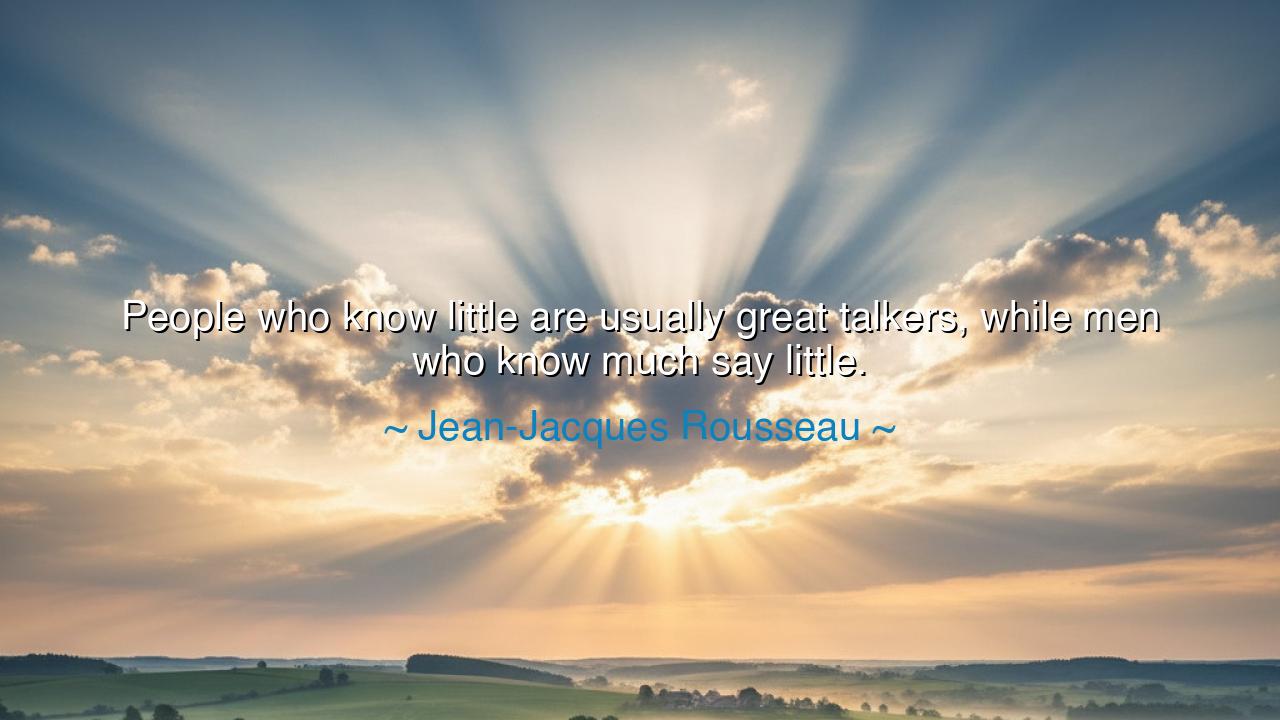
People who know little are usually great talkers, while men who






“People who know little are usually great talkers, while men who know much say little.” Thus spoke Jean-Jacques Rousseau, the philosopher of the Enlightenment whose pen ignited revolutions not only of politics, but of thought and spirit. In these few words, he revealed a truth that has echoed through every age — that true wisdom is quiet, while ignorance is loud. The one who truly understands the world feels no need to boast of his understanding; he observes, he reflects, and he speaks only when his words can bring light. The one who knows little, however, mistakes noise for knowledge and believes that speaking much is the same as thinking deeply.
Rousseau lived in a time of brilliant discourse, where salons and academies were filled with men who prided themselves on eloquence and wit. Yet he saw through the glitter of words to the emptiness beneath. In his Emile and The Social Contract, he spoke often of the corruption of simplicity, of how society teaches people to perform wisdom instead of pursuing it. To him, talk without substance was vanity — an attempt to appear learned rather than to become so. He knew that the truly wise man, like the sage of the ancients, speaks only after long silence, for he understands the weight of words and the cost of truth.
The meaning of Rousseau’s quote lies in the contrast between appearance and essence. Those who know little are full of certainty, because their minds are not burdened by the complexity of truth. They see the world in sharp, simple lines and thus speak with unearned confidence. Those who know much, however, have glimpsed the vastness of what they do not know. They have wandered through the forest of knowledge and found it endless. For them, speech becomes sacred, not casual; they know that words can mislead as easily as they can enlighten. Thus, they speak less — not from timidity, but from reverence for truth.
Consider the example of Socrates, the philosopher who claimed to know nothing. In the crowded squares of Athens, he listened more than he spoke, questioning rather than proclaiming. Yet in his silence and in his humility, he revealed greater wisdom than the proud orators who surrounded him. His student Plato recorded that Socrates’ restraint in speech was not weakness, but mastery — for he understood that every word has power, and that silence is often the companion of insight. His calm questioning disarmed arrogance and led others to discover the truth within themselves.
Rousseau’s insight also warns us of a danger that lies within every human heart: the temptation to fill the air with words when we are unsure of ourselves. The more fragile our understanding, the more we seek validation in sound. But talk that is not born from knowledge is like wind without direction — loud, fleeting, and empty. The wise person learns that silence is not ignorance; it is preparation. Just as a blacksmith must heat the iron before striking, the thinker must let his thoughts mature in quiet before he speaks them. The shallow man rushes to speak; the deep man waits until speech becomes necessary.
History offers countless examples of this truth. Abraham Lincoln, known for his quiet thoughtfulness, was often mocked for his pauses and silences. Yet in those silences, he weighed his words as one weighs gold. When he finally spoke, his words carried the force of conviction, clarity, and wisdom — words that could mend a nation torn by war. In contrast, many around him filled the air with rhetoric but achieved nothing. So it has ever been: great talkers impress crowds, but great thinkers move history.
Therefore, O seeker of truth, let this teaching be a mirror to your own soul. Do not mistake talking for understanding. Seek to listen more than you speak, and when you speak, let your words rise from reflection, not impulse. Remember that wisdom is not measured by how much you say, but by how much meaning lives in what you say. Be like the mountain that stands silent but holds worlds within it, not like the storm that shouts but passes quickly away.
For as Rousseau teaches, knowledge humbles, while ignorance inflates. The wise speak softly because they understand the depth of mystery that surrounds all things. The fool shouts because he mistakes the echo of his own voice for the voice of truth. Strive, then, not to be the loudest, but to be the truest. Let your silence be rich with thought, and your speech be worthy of the silence it breaks. In this way, your words will endure — not as noise, but as wisdom born from quiet understanding.






AAdministratorAdministrator
Welcome, honored guests. Please leave a comment, we will respond soon